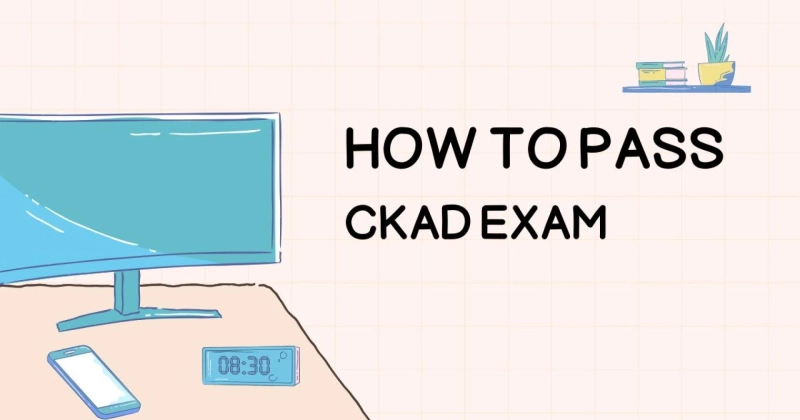The Certified Kubernetes Application Developer (CKAD) certification has become a cornerstone credential for developers working with containerized applications. As Kubernetes continues to dominate the container orchestration landscape, mastering this exam opens doors to lucrative career opportunities. However, success requires strategic preparation and understanding of what makes this certification unique in the cloud-native ecosystem.
Understanding the CKAD Certification Landscape
The CKAD exam differs significantly from traditional multiple-choice certifications. This hands-on, performance-based assessment evaluates your ability to design, build, and deploy cloud-native applications on Kubernetes clusters. With a 66% passing score requirement and 19 questions to complete in 120 minutes, time management becomes crucial alongside technical proficiency.
Recent statistics show that over 40% of candidates struggle with the practical nature of the assessment. Unlike theoretical exams, this certification demands real-world problem-solving skills under pressure. Understanding this reality is the first step toward effective ckad certification preparation.
Essential Study Strategies for Success
Master Core Kubernetes Concepts
Begin your preparation by solidifying fundamental Kubernetes knowledge. Focus on:
Pod Management and Configuration: Understanding pod lifecycle, multi-container pods, and init containers forms the foundation of application development. Practice creating pods with various configurations, including resource limits, environment variables, and volume mounts.
Services and Networking: Learn how to expose applications through different service types. Network policies and ingress controllers often appear in ckad exam questions, making this knowledge essential for success.
Storage and Persistence: Persistent volumes, persistent volume claims, and storage classes require hands-on practice. Many candidates underestimate the complexity of storage-related scenarios.
Develop Time Management Skills
The exam's time constraints demand efficient problem-solving approaches. Successful candidates recommend:
- Practicing with a timer to simulate exam conditions
- Learning kubectl shortcuts and aliases to speed up command execution
- Developing a systematic approach to troubleshooting failed deployments
- Mastering YAML manipulation techniques for quick configuration changes
Build Practical Experience
Theoretical knowledge alone won't guarantee success. Establish a dedicated practice environment using:
Local Kubernetes Clusters: Tools like Minikube, Kind, or Docker Desktop provide accessible practice environments. Regular hands-on experience builds muscle memory for common tasks.
Cloud-Based Learning Platforms: Many candidates benefit from structured learning environments that provide guided labs and realistic scenarios.
Leveraging Quality Study Resources
Official Documentation and Training
The Kubernetes official documentation serves as the primary reference during the exam. Familiarize yourself with its structure and search functionality. The Cloud Native Computing Foundation offers comprehensive training materials specifically aligned with exam objectives.
Practice Questions and Mock Exams
While avoiding unreliable ckad dumps that may contain outdated information, focus on legitimate practice resources. Quality ckad exam questions and answers from reputable sources help identify knowledge gaps and improve problem-solving speed.
Effective ckad certification questions should mirror real-world scenarios rather than simple recall tasks. Look for resources that provide detailed explanations and alternative solution approaches.
Community Resources and Study Groups
The Kubernetes community offers valuable support through:
- Online forums and discussion groups where experienced practitioners share insights
- Open-source practice repositories with realistic exam scenarios
- Local meetups and virtual study sessions with fellow candidates
Advanced Preparation Techniques
Create Your Own Lab Scenarios
Develop custom ckad example questions based on real workplace challenges. This approach helps connect exam concepts with practical applications while building confidence in problem-solving abilities.
Focus on Debugging and Troubleshooting
Many exam scenarios involve fixing broken configurations or diagnosing application issues. Practice systematically approaching problems:
- Identify symptoms and gather information
- Form hypotheses about potential causes
- Test solutions incrementally
- Verify fixes through application behavior
Master Configuration Management
Understanding how to work with ConfigMaps, Secrets, and environment variables efficiently can save precious exam time. Practice various methods of injecting configuration data into applications.
Why Choose Pass 4 Future for Your Certification Journey
Pass 4 Future understands the unique challenges of performance-based certifications. Our comprehensive approach combines structured learning paths with hands-on practice opportunities, ensuring you're prepared for both the technical challenges and time pressures of the exam.
Our platform provides carefully curated study materials that align with current exam objectives while avoiding the pitfalls of outdated or unreliable content. With Pass 4 Future, you gain access to proven strategies that have helped thousands of candidates achieve certification success.
Final Success Tips
Success in the CKAD certification requires consistent practice, strategic study approaches, and confidence in your abilities. Focus on understanding concepts deeply rather than memorizing commands. The exam tests your ability to solve real problems, not recall specific syntax.
Regular practice with time constraints, through understanding of Kubernetes fundamentals, and familiarity with the exam environment will significantly improve your chances of success. Remember that this certification validates practical skills that directly translate to career advancement and increased earning potential.
Start your preparation journey today with a clear study plan, quality resources, and the determination to master one of the most valuable certifications in the cloud-native ecosystem.



